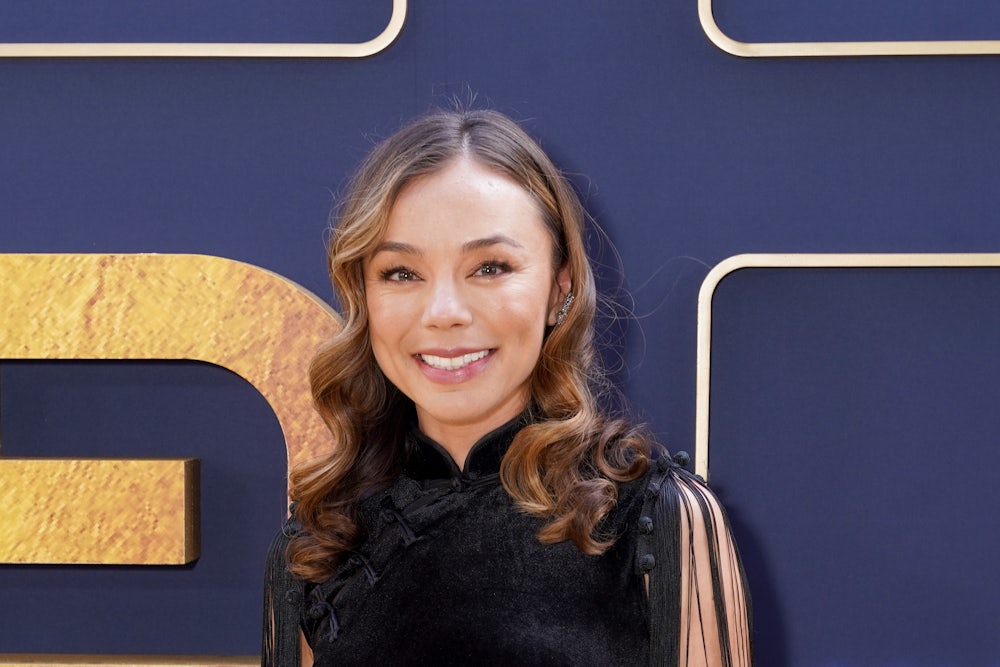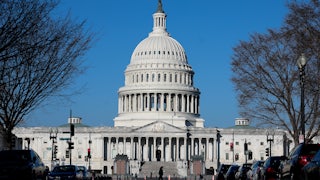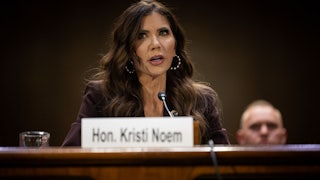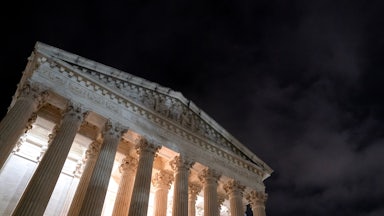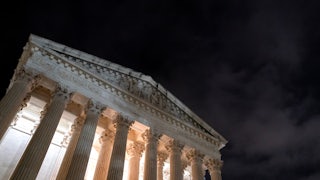Robert F. Kennedy Jr. on Tuesday announced that he’s chosen a running mate for his third-party presidential run: Nicole Shanahan, a 38-year-old investor, Silicon Valley lawyer, and Democratic donor who was previously married to Google co-founder Sergey Brin.
This might seem like a strange choice. Shanahan has no political experience or national name recognition. Her image as a wealthy dilettantish sort has no obvious appeal to the disaffected voters that Kennedy hopes to lure from President Biden and Donald Trump.
But if you want to understand this decision—and why Democrats believe it poses a potential problem for them—follow the money. To get on the ballot in numerous states, Kennedy will need to fund a large operation. Shanahan has already proven willing to bankroll Kennedy’s efforts, shelling out $4 million to fund that 1960s nostalgia-themed ad about the Kennedy family during the Super Bowl, which the other Kennedys sharply criticized.
Kennedy does have other reasons to choose Shanahan. She appears to be at least partly ideologically aligned with him: While she told The New York Times that she isn’t an anti-vaxxer, as Kennedy is, she seemed to agree with theories that link vaccines for kids to things like autism. She also proclaimed herself moved by “pockets of silent support” for Kennedy’s bid, meaning she’s imbibed a gallon of Kennedy Kool-Aid about the country supposedly hungering for his third-party challenge.
But in the small world of Democrats who are working to thwart Kennedy’s bid to take votes from Biden—viewing him as a spoiler who would primarily benefit Trump—the money is what really looms large in Kennedy’s decision.
Here’s why: Though Kennedy’s candidacy has been justifiably mocked, the simple fact is that senior Democrats think he has a reasonable chance of getting on the ballot in numerous swing states. That could make the difference in a very close Biden-Trump contest.
To be sure, Democrats have mounted an aggressive effort to challenge Kennedy’s ballot access on many fronts. But there’s good reason to think it might not work.
Initially, a pro-Kennedy Super PAC was the entity collecting signatures to get him on the ballot in many states. That was vulnerable to legal challenges on the grounds that this constituted improper coordination between a Super PAC and a campaign.
But that pro-Kennedy PAC recently suspended that signature collection, and the Kennedy campaign, such as it is, will pick up that task. Now, Democrats say, if Shanahan’s money bankrolls that effort, there’s no reason to assume it will fail.
“All of her money is hard money, so they can use it for anything, including ballot access,” said Matt Bennett, a co-founder of the Democratic centrist group Third Way, meaning it could be used to fund campaign activities, and as a self-funder, her contributions could be unlimited.
“The reality is he will probably be on the ballot in the six swing states, which is where he will matter,” Bennett continued, referring to Pennsylvania, Michigan, Wisconsin, Arizona, Nevada, and Georgia. “While no one knows precisely what the impact will be, anything that divides the anti-Trump coalition is dangerous.”
Kennedy is also flirting with running on the Libertarian Party line, which would give him ballot access in many more states. That might not pan out, but if it does, Bennett says, “They can use her money for advertising, get out the vote, travel, and other expenses campaigns face.”
Well-funded ads could be particularly well suited to help Kennedy with what appears to be his primary political mission right now. That’s to speak to disaffected voters by casting Trump, Biden, and both parties as part of the same failed, corrupt establishment.
As Gabriel Debenedetti reports, Democrats are concerned that young and male, sometimes nonwhite voters appear intrigued by Kennedy’s candidacy. Those are exactly the voters Biden must keep, and the sort of demographic that might be reachable with “a plague on both your houses” messaging delivered by an outsider with a vague but storied celebrity aura.
Still, Democrats involved in the stop-Kennedy effort point out that he’s benefiting from a kind of temporary twofer. He has high name recognition as a Kennedy and benefits from that positive association—even as voters don’t know about his range of crackpot positions or that other Kennedys have condemned his candidacy and are rallying behind Biden.
Indeed, according to a source familiar with Democratic research on Kennedy, when voters are informed that Kennedy family members oppose his presidential bid and that a megadonor backing Trump has put money into his effort, they see these as serious strikes against him.
There are plausible reasons why Kennedy might fail to pose a threat to Biden. His bid for ballot access might fail: His campaign appears to be blundering on this front, as evidenced by the news that it gathered a lot of access signatures in Nevada that may get invalidated because he hadn’t listed a running mate on his petition, as required by state law.
What’s more, as Bill Scher points out, the only swing state where Kennedy has collected the necessary signatures is New Hampshire, and he’s badly lagging behind where third-party-challenger Ross Perot was in the signature-gathering process by this time in 1992. And many voters seduced by Kennedy’s media presence don’t know the first thing about him. He will face an onslaught filling those blanks, and there’s a lot of brutal material for Democrats to work with here.
But still: Kennedy only has to get on the ballot in one or two key states, and pull relatively small percentages of votes from Biden, to return Trump to the White House.
“In 2000 and 2016, we ignored independent and Green Party candidates,” said Lis Smith, who’s advising the effort to battle third-party candidates by the DNC, referring to Ralph Nader and Jill Stein.
“We can’t afford to do that in 2024, when we’re expecting a very close election,” Smith concluded. Unfortunately, Shanahan’s money threatens to make it a whole lot closer.
